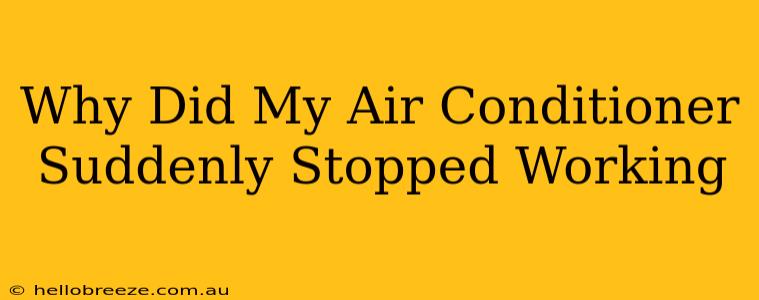Summer heat can be brutal, and when your air conditioner suddenly quits, it's a major inconvenience. This guide explores common reasons why your AC might have unexpectedly stopped working, helping you troubleshoot the problem and potentially avoid costly repairs.
Common Reasons Your AC Stopped Working
Several factors can cause your air conditioner to fail. Let's delve into some of the most frequent culprits:
1. Power Issues:
- Tripped Breaker or Blown Fuse: This is the most common reason for an AC to stop. Check your home's electrical panel for a tripped breaker (it will be switched to the "off" position) or a blown fuse (it will appear broken). Simply reset the breaker or replace the fuse to see if this resolves the issue.
- Power Outage: A widespread power outage in your area will, naturally, shut down your AC. Check with your local power company to see if there's an outage.
2. Thermostat Troubles:
- Incorrect Settings: Double-check your thermostat settings. Make sure it's set to "cool" and that the temperature is set lower than the current room temperature. Also ensure the system is turned "on".
- Faulty Thermostat: If the settings seem correct but nothing happens, the thermostat itself might be malfunctioning. Try replacing the batteries (if applicable) or consider that the thermostat might require replacement.
- Programmed Settings: Some thermostats have programmable settings that might have inadvertently turned off the AC. Review your thermostat's programming.
3. Refrigerant Leaks:
- Low Refrigerant: Refrigerant is essential for cooling. A leak can cause your AC to stop working entirely. This requires professional service; do not attempt to refill refrigerant yourself.
- Frozen Evaporator Coil: Low refrigerant can also cause the evaporator coil to freeze, further hindering operation. This necessitates professional attention.
4. Condenser Unit Problems:
- Dirty Condenser Coils: Dust, dirt, leaves, and other debris can restrict airflow, causing the unit to overheat and shut down. Clean the coils regularly to prevent this. (Consult your AC manual for cleaning instructions.)
- Blocked Airflow: Ensure nothing is obstructing the airflow around the condenser unit, such as overgrown vegetation, furniture, or other objects.
5. Compressor Issues:
- Compressor Failure: The compressor is the heart of your AC system. Failure can be due to various reasons, including age, wear and tear, or electrical surges. This usually requires professional repair or replacement.
- Overheating: The compressor can overheat due to issues like refrigerant leaks or blocked airflow, leading to shutdown.
6. Electrical Problems:
- Wiring Issues: Loose connections or damaged wiring in the system can cause malfunctions. This requires the expertise of an HVAC technician.
- Capacitor Problems: A faulty capacitor can prevent the compressor from starting. This is another issue best handled by a qualified professional.
When to Call a Professional
If you've checked the simple things like power and thermostat settings and your AC is still not working, it's time to call a qualified HVAC technician. Problems like refrigerant leaks, compressor issues, or electrical faults require professional diagnosis and repair. Ignoring these issues can lead to further damage and costly repairs in the long run.
Remember to always prioritize safety. Never attempt to repair your AC system yourself unless you have the proper training and experience. Incorrect repairs can lead to further damage or even injury.
By understanding the common causes of AC failure, you can better troubleshoot the problem and get your cool air back quickly.

